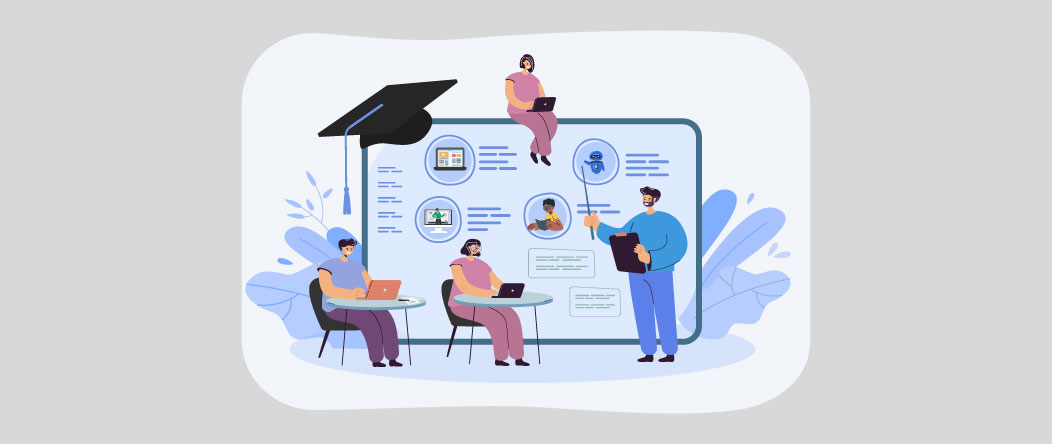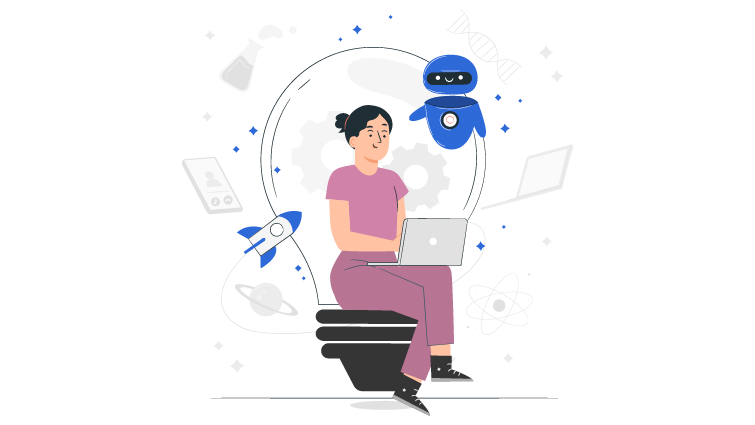The traditional one-size-fits-all educational approach just throws students with different backgrounds, learning styles, and aptitudes together and expects all of them to perform their best. But it’s not hard to see why this is a problem. We’re not all the same, so it’s unreasonable to expect us to learn the same way. Adaptive learning acknowledges this and strives to provide every student with the right environment and tools to help them learn their best. What this means for higher education is that more students will be able to pass their classes and ultimately graduate – which is excellent news for institutions!
What is Adaptive Learning?
Before we dive into what adaptive learning means for higher education, let’s first look into ‘What is adaptive learning?’ and ‘How does adaptive learning work?’. Adaptive learning means tailoring the study materials to students’ specific educational needs and preferences. Think of it like getting a custom-made suit that fits you perfectly because it was based on your unique measurements. Similarly, adaptive learning ensures that the learning materials or tools adapt to pace and style. So, if you’re a visual learner, an adaptive learning approach would mean visual information to help you study better. But that’s not it – since the system is adaptive, it will also consider your interaction with the content and your performance to personalize your study materials further. So, let’s say you’re preparing for a geography exam. An adaptive learning model could note which countries you can identify correctly or incorrectly and help you focus on those. The overall idea is to try to eliminate your weaknesses.
What Are the Benefits of Adaptive Learning?
Considering and implementing adaptive learning carefully involves first implementing personalized learning.
But wait – what are the benefits of adaptive learning, and why should we even care so much about its implementation?
Well, some of the significant benefits of adaptive learning are as follows:
#1 Learning Has More Purpose
With adaptive learning, students have a greater sense of purpose because learning isn’t generic – it’s tailored to their needs. So they can concentrate on the topics and concepts that they don’t understand very well rather than monotonously reviewing the material. Ultimately, this means that learning has more purpose for them since they’re targeting problem areas.
#2 Adaptive Learning Addresses Student Concerns
Another benefit of adaptive learning is that it directly addresses student concerns, which ensures a better understanding of study materials. Eventually, this translates to better student performance.
#3 Helps Students Study Faster
Students can learn faster when they only have to focus on specific concepts. Plus, avoiding redundancy ensures they’re engaged and more enthusiastic about learning since the information is still relatively new.
#4 Fills Knowledge Gaps for Students
Adaptive learning works by identifying knowledge gaps for students, i.e., the specific concepts they’re struggling with. So, students can ultimately use this information to fill in the gaps, focus more on these topics, and work to gain a deeper understanding.
#5 Improves Student Engagement
Students will stay engaged if they find the content or materials interesting. So, the trick to keeping students engaged in class is to adopt an adaptive learning approach. Such a strategy would ensure that students are actively involved in the learning process and can better grasp concepts – even the harder ones. Also, the result would be more than just student engagement – students would have a much better understanding of core textbook concepts, which is a win-win for educators and institutions.
#6 Adaptive Learning Empowers Learners
Adaptive learning focuses on the student and encourages active learning, significantly amplifying student involvement in the learning process. So, rather than simply passively reviewing the provided learning materials, students can actively engage in choosing how they learn and learning how they learn best. Overall, this helps students take charge and feel more empowered. Plus, it can boost their confidence because they know exactly where they’re struggling and how they can overcome any hurdles to learning. In short, they feel more “in control”.
Why Institutions Absolutely Need to Implement Adaptive Learning
Adaptive learning is a big player in the modern educational landscape – and it’s not hard to see why. Adaptive learning is more than just another learning strategy. It’s a complete learning model that generates results 100% of the time if implemented correctly because it focuses on the specific learning needs of every student. Imagine if a teacher could give every student 1:1 attention while ALSO catering to their individual learning needs and preferences. If the student were struggling, they would further explain every tiny detail of that topic until that student understood the whole thing. There’s no way that student could fail, right?
Well, adaptive learning is similar to this because it’s like a tailored suit that fits every student perfectly!
When you understand the benefits of adaptive learning for students, you’ll know how institutions can implement it to increase their impact. So, if institutions want to ensure that their students are getting the best education and learning something in their classes, they should consider adaptive learning to facilitate student success.
How Can Adaptive Learning Improve Higher Education?
Implementing adaptive learning can benefit educational institutions and higher education in general. It enables the use of a data-driven approach to making learning-related decisions. For example, educators can understand how students interact with their content and then tweak it accordingly to make it more useful for students. Doing so effectively incorporates data into the educational framework, essential to drive results.
So adaptive learning can improve higher education in the following ways:
- Educators and content creators can make study materials more effective and, in turn, more helpful for students.
- Students can identify their strengths and weaknesses and work smarter to gain a deeper understanding of complex concepts.
- Students can take charge of their learning and be more involved in the learning process.
- Educational institutions can ensure learning equity among students (at least to a certain extent) by providing every student with the content and resources they need to succeed academically.
Implement Adaptive Learning with SimpliTaught’s AI
Now that we know ‘What is adaptive learning?’, ‘What are the benefits of adaptive learning?’ and ‘How does adaptive learning work?’ the next step is to consider and implement adaptive learning carefully in your educational institution – and that’s where technology comes in!
Selecting adaptive learning software is a significant first step to implementing adaptive learning at your institution. But don’t search the web for the best online learning platforms based on adaptive learning just yet because we’ve got you covered!SimpliTaught is an online learning platform for higher education that provides collaborative learning solutions to ensure student engagement, retention, and success! So, if you’re looking for adaptive learning software for your institution, contact us at info@simplitaught.com or our website for more information.





